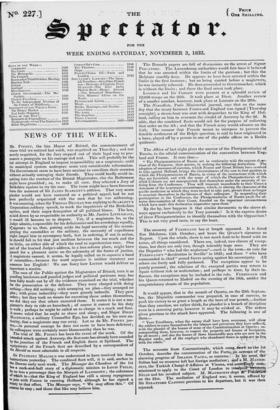NEWS OF THE WEEK.
Ma. PINNEY, the late Mayor of Bristol, the commencement of w&ise trial we noticed last week, was acquitted on Thursday ; and not merely acquitted, for the Jury stepped out of their legal way to pro- nounce a panegyric on his courage and zeal. This will probably be the last attempt in England to impose: responsibility on a magistrate, until the municipal system undergoes some very considerable reformation. The Government seem to have been anxious to conciliate their enemies without actually outraginr, their friends. They could hardly avoid in- quiring into the conduct of the Bristol Magistrates, else the Reformers might have grumbled; so, to make all sure, they selected a Jury of Berkshire squires to try the case. The issue might have been foreseen from the moment of Sir JAMES SCARLETT'S address. That very acute pleader would not have ventured on a political appeal, had he not been perfectly acquainted with the men that he was addressing. It was amusing, when Sir Tnom AS DENMAN was replying to SCARLETT'S Corporation-robbery speech, to mark the impatience of the Berkshire squires, and their angry denegation of all political biases. The law, aslaid down byso respectable an authority as Mr. Justice LITTLEDALE, it would ill become us to dispute. Yet, if a magistrate be, as the Judge admits, responsible for his deficiencies and his overdoings equally, it:appears to us, that, putting aside the legal necessity of his accom- panying the constables or the military, the necessity of expedience might impel him to accompany both, lest in ordering, if not in action, be should fail to hit that just medium between the too much and the too little, on either side of which the road to reprehension runs. One part of the learned Judge's address, in a less solemn place, might have passed for a pleasant satire on the solemnity of the forms of justice. A magistrate cannot, it seems, be legally called on to organize a band Of constables—because the word organize is neither statutory nor common law English ! We can fancy how Ludrox would deliver so important a maxim.
The case of the Public against the Magistrates of Bristol, turn it as Puzzling barristers and puzzled judges and political partisans may, has been fully made out by all the evidence examined on the trial, whether for the prosecution or the defence. They were charged with doing nothing—they did nothing; with arranging no plan—they arranged no plan; with gross imbecility—they were grossly imbecile. They gave orders; but they took no means for executing these orders themselves, nor did they see that others executed them. It seems it is not a ma- gistrate's duty to ride on horseback; of course it cannot be his duty to walk; perhaps he might be called on to charge in a coach and four. It seems ruled that he ought to shave and sleep ; and Major DIGBY MACKWORTII, a military Counsellor Ego, has decided, on his own au-
thority, that a magistrate may run away. Let us do Mr. Prxrimr
jUs- hice,.....jn personal courage he does not seem to have been deficient; hi colleagues were certainly more blameworthy than he was. The trial of Mr. PINNEY has been the event of the week. Of the jurended attack against Antwerp, the first note has already been sounded by the junction of the French and English fleets at Spithead. The equipments of the French fleet are described by a correspondent of
Herald as most admirable in all respects.
Sir PULTENEY MALCOL3I was understood to have received his final Ins. tractions yesterday. The combined fleet will, it is said, anchor in !he Downs early next week. The Messager des Chambres of the 1st nas a cock-and-bull story of a diplomatic mission to Lours PHILIP, 1)1' no less a personage than the Marquis of LANSDOWN ; the.substance !If Which is-"--that the King of - England has still a strong repugnance !°.loin with France in coercing Holland, although be has signed a ueuty to that effect. The Massager says, "We may affirm this." Of Course he may; and those that like may believe him.



















































